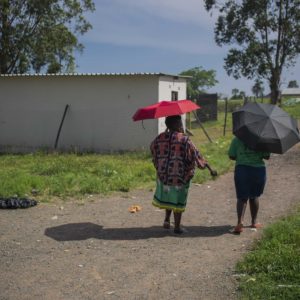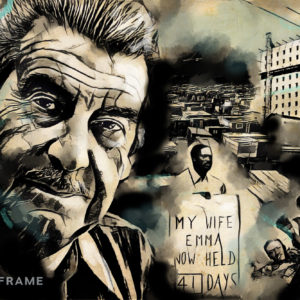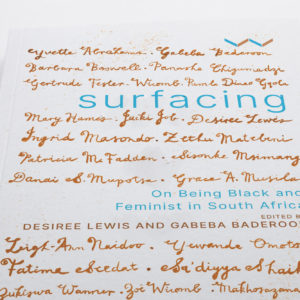Fellowship is the perfect fit for rising star
This year’s Eugene Saldanha fellow, Naledi Sikhakhane, aims to tell the stories of those who are not seen or heard because she knows what it feels like to be that person.
Author:
15 February 2022

Naledi Sikhakhane, 27, sees writing in the name of the late journalist and social justice activist Eugene Saldanha as an opportunity to restore trust in South African journalism and champion the human rights of each and every citizen.
Sikhakhane will spend a year at New Frame after she was selected as the Eugene Saldanha fellow for 2022. She says she is passionate about writing with the same care and persistence as pioneering South African journalists like him.
Her interest in journalism was sparked in her first year in high school when she saw a cousin, who was a journalism student at the time, compiling a photo essay for an assignment. Sikhakhane was immediately curious and from this point she knew journalism was what she wanted to do.
Growing up in socioeconomically diverse parts of KwaZulu-Natal exposed Sikhakhane to the disparities in South Africa and gave her an understanding of what society is truly like. It sparked her interest in issues of social justice, eventually leading her to the kind of journalism she does today. Among other places, she spent time in Hammarsdale, a town notorious for its long history of political killings and taxi violence. It continues to be a focus of Sikhakhane’s writing, as she says these issues have persisted.
Related article:
After graduating from the Durban University of Technology in 2017 and spending almost two years unemployed, Sikhakhane began freelancing. One particularly formative experience for her was a workshop on solutions journalism that she attended.
“They were speaking about how the kinds of voices you pick in a story are important. Who do you choose to speak to? Who do you give more airtime to? If I hadn’t gone to that workshop, maybe things wouldn’t have clicked as much as they do now about how to approach social justice work.”
Yet social justice reporting was not a conscious choice for Sikhakhane. “When I was at varsity, I wasn’t as intentional as I am now. I was just trying to get through it honestly,” she says.
The stories that matter
Once she started freelancing, Sikhakhane began to notice a theme running through the kinds of stories she pursued. Early in her career, she wrote an article on an asylum seeker who had been stuck in the system for 16 years. Sikhakhane still remembers the woman crying over the thought that nobody in this country would think to tell her story.
But Sikhakhane did and she remains drawn to vulnerable individuals and groups who rarely have a platform to tell their stories. “These things matter,” she says, “and I pursue the stories because they need to be told.”
Over time, Sikhakhane has been able to focus her work on challenges faced by people living in shack settlements as well as women, students and workers fighting for their rights. According to Sikhakhane, her biggest goal is to drive people to action through her journalism.
Related article:
Eventually, finding her passion in social justice work led Sikhakhane to New Frame and the Eugene Saldanha fellowship. It is an opportunity she says she is honoured to have because it lets her continue telling stories that have an impact on people’s lives.
The Eugene Saldanha Memorial fellowship was set up by the Charities Aid Foundation Southern Africa (Cafsa) and the Mail & Guardian in 2007 as a way to commemorate Saldanha’s work. He was a journalist for The Star for six years and a human rights activist. But he would later grow frustrated with journalism in the country and leave the publication.
Saldanha started two non-governmental organisations (NGOs), the Non-Profit Partnership and Cafsa. His legacy endures not only through the fellowship in his name, but also in all that he did to strengthen South Africa’s not-for-profit sector.
Time to explore
Currently the Saldanha fellowship is supported through a new partnership between New Frame and the Summit Educational Trust (SET). The annual fellowship provides young journalists with the opportunity to report on “poverty, inequality and the realisation of human and socioeconomic rights”, and it is meant to empower journalists like Sikhakhane to use their platform to expose the inequalities and injustices that exist.
“I think the fellowship is amazing,” says Sikhakhane. “When you read about what Eugene Saldanha did for journalism in the country as a person of colour in apartheid times … The Star was close to being banned a couple of times because they were trying to speak truth to power, which is what we’re trying to do as New Frame and what I am trying to do as Naledi.”
Related article:
For Sikhakhane, a Black woman who was raised by a single parent and funded her own way through university, the fellowship is an honour because it means she gets to do what is ingrained in her: advocating for others.
She wants to write stories that express the same sociopolitical concerns she has always covered in the different media in which she has worked. She also plans to study further and hopes to see more of the world to widen the scope of what she writes about.
“I feel like I don’t know enough … Sometimes I think of a topic and realise it’s important and I should cover it, but I may not be able to do justice to it. There’s a lot I still want to learn. I want to go back to varsity somehow, read more, travel more, meet more people, live more … I can’t wait to see the kind of writer I am at 40.”
Correction, 24 May 2022: The Eugene Saldanha Memorial fellowship is supported by the SET. It was incorrectly referred to as a fund.



